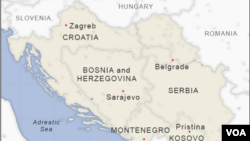The U.N. human rights office condemns the rise of hate speech in Bosnia and Herzegovina and Serbia, warning it could incite violence between Serbian and Muslim ethnic groups that fought a devastating war following the breakup of Yugoslavia.
Religious holiday celebrations in the autonomous Serb Republic of Srpska last weekend unleashed a torrent of nationalistic rhetoric and hate speech targeting certain communities.
U.N. human rights officials say individuals in Bosnia and Herzegovina and in Serbia glorified atrocity crimes and convicted war criminals, including Radovan Karadzic and Ratko Mladic.
U.N. human rights spokeswoman Liz Throssell calls the incidents an affront to survivors, including those who returned to their homes after the conflict.
“The failure to prevent and sanction such acts, which fuel a climate of extreme anxiety, fear, and insecurity in some communities, is a major obstacle to trust-building and reconciliation," said Throssell. "As we have repeatedly highlighted, the rise in hate speech, the denial of genocide and other atrocity crimes and the glorification of war criminals in the Western Balkans highlight the failure to comprehensively address the past.”
About 100,000 people were killed in the Bosnian war between 1992 and 1995. More than 8,000 Bosnian Muslim men and boys were murdered in July 1995 in the Srebrenica massacre, also known as the Srebrenica genocide. The killings were perpetrated under the command of Ratko Mladic, who led the Army of Republika Srpska.
Elections are due to take place in Serbia in April and later in October in Bosnia and Herzegovina. Throssell warns failure to prevent and sanction inflammatory hate speech will exacerbate the already extremely tense political environment.
“We stress once again the need for the authorities in Serbia and in Bosnia and Herzegovina to abide by their international human rights obligations to ensure the rights to truth, justice, and reparation," said Throssell. "They should also adopt measures to prevent recurrence and to promote further reconciliation efforts. We call on them to condemn and refrain from any advocacy of national, racial or religious hatred.”
She says all perpetrators and instigators of such acts must be held accountable.
The U.N. human rights office is calling on political and religious leaders to speak out against intolerance and discriminatory instances of hate speech.




